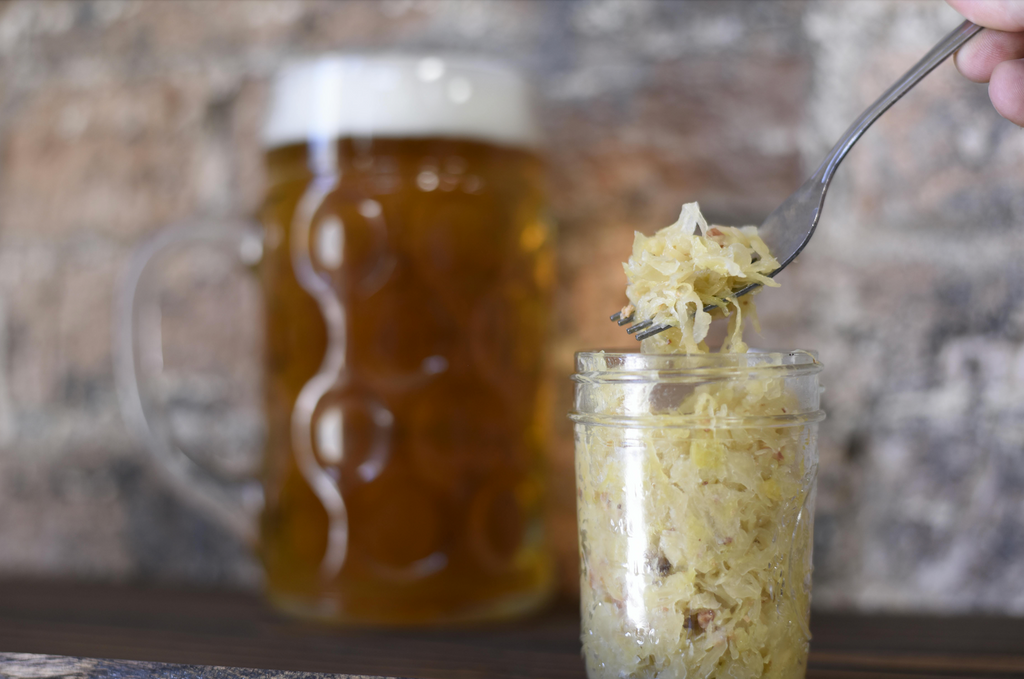Fermented foods such as sauerkraut have been with us for thousands of years, the staple diet of our ancestors. But they’ve enjoyed a renaissance in recent times. Not just for their incredible flavour, but also because of their probiotic and prebiotic benefits for gut health. Sauerkraut, due to the fermentation process driven by bacteria, provides more nutrients than the cabbage it is made from. For example, the link between sauerkraut and essential nutrients such as Vitamin K2 has been uncovered.
Thought to have originated over two thousand years ago in China, fermented foods were originally used to preserve vegetables for eating during the so-called “hungry gap” of winter.
Long prior to refrigeration and frozen foods, fermented foods such as sauerkraut provided sustenance and nutrition for communities to last through the long, colder months, particularly in cooler climates.
Cabbage was one of the easiest and most used vegetables for this preparation. As the practice spread throughout the world, the food took on different names and became associated with different regions. Two of the most well-known are sauerkraut (German for “sour cabbage”) and the Korean version kimchi, which is usually a spicier version of sauerkraut.
However, it was (and remains) a favourite in Central, Northern and Eastern Europe, where it’s an important part of the local cuisine.
While used primarily for preservation, the lactobacillus that occurs naturally on the vegetables that drive the fermentation process also delivers many health benefits. Recent discoveries have found fermented foods such as sauerkraut as being beneficial for balancing the good bugs in the gut microbiome.
But the fermenting process also means sauerkraut is far more nutritious than simply cabbage. Just one of the ways it does so is through the production of Vitamin K2 or menaquinone, which may be an essential weapon to help us fight several chronic diseases.
Sauerkraut and Vitamin K2
It’s fair to say that Vitamin K flies a little under the radar. While many of us are aware of the necessity of the need for Vitamins A, B, C in the diet and through adequate sunlight for Vitamin D, our knowledge may falter a little when it comes to K.
For example, we may have an idea of what foods contain Vitamin C (e.g., lemons, broccoli, kiwifruit and parsley) and know that they are essential in the diet. But can we say the same about Vitamin K?
Vitamin K can be divided into two groups: vitamin K1 (phylloquinone) and vitamin K2 (menaquinone). While K1 is present in green, leafy vegetables such as spinach, broccoli and cabbage, K2 only appears in animal and fermented foods.
Vitamin K2 is considered to help prevent osteoporosis and help bone health. It also helps prevent calcium deposits in arteries and therefore contributes towards heart health. Indeed, one of the biggest studies on dietary intake and heart health, the Rotterdam Study, has shown a reduced risk of heart disease from those who eat a diet high in Vitamin K2.
From the report’s introduction.
"The study shows that people who consumed most vitamin K2 through vitamin K2 rich foods (mainly fermented foods and meat from animals fed K3), had a 50% reduced risk of arterial calcification and also a 50% risk reduction for cardiovascular events during the study period.” (1)
During fermentation, the bacteria that live on and in and around the vegetables feed on the carbohydrates that make up the vegetables, multiplying and propagating as they do so. In a fascinating way, these same bacteria synthesise vitamin K2 as they are feeding and multiplying. This means that, to a point, the longer a vegetable is fermented, the more vitamin K will be produced.
Here at Gutsy Ferments, we ferment our vegetables for months, not days. Long fermentation is important to us for the production of more bacteria, the reduction of carbohydrates and, yes, the synthesis of Vitamin K. In fact we pride ourselves on producing healthy and delicious sauerkraut made the old-fashioned way. Our methods of making fermented foods such as sauerkraut and kimchi are the same as those used by people for thousands of years. For an insight into the extent we go to ensure you get the finest sauerkraut and kimchi, using oak-barrel-aged, organic and locally produced vegetables, check our video on our home page.
You’ll find our delicious, fermented foods for sale here in our online shop.
*Please also note that a diet high in fermented foods is no substitute for medical advice if you have cardiovascular disease or osteoporosis. We highly recommend you consult your health professional on the best way to manage your condition.




